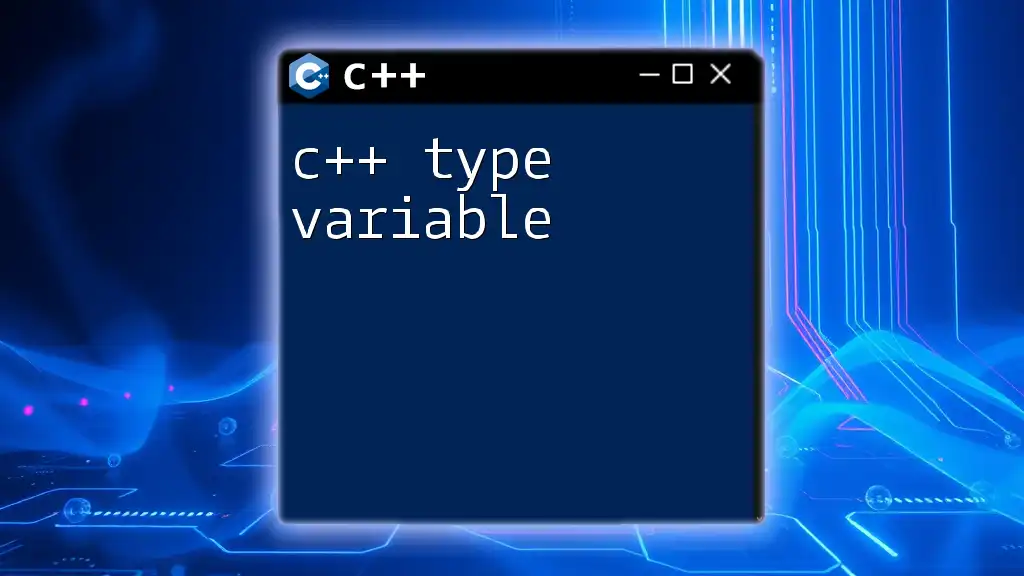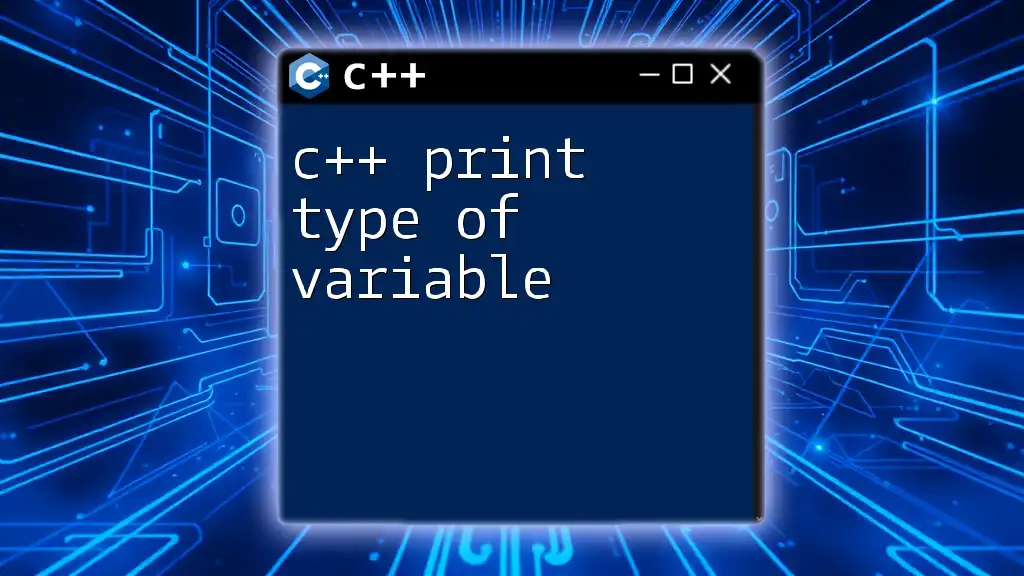In C++, variables can be of various types such as int, float, double, char, and string, each serving different purposes to store different kinds of data.
int age = 25; // Integer type variable
float height = 5.9; // Floating point type variable
char initial = 'A'; // Character type variable
string name = "John"; // String type variable
Understanding C++ Variables
What is a Variable?
In C++, a variable is a symbolic name associated with a value and whose associated value may change. Variables serve as a fundamental building block in programming, allowing developers to store data values and manipulate them throughout their programs. Without variables, programming would be cumbersome and inefficient.
Variable Naming Conventions
When naming variables in C++, follow these rules to ensure clarity and maintainability:
- Variable names should begin with a letter or an underscore, followed by letters, digits, or underscores.
- Names are case-sensitive (`myVariable` and `myvariable` are different).
- Avoid using keywords or reserved words.
- Use descriptive names for better readability, e.g., `totalAmount` rather than `ta`.
Examples of valid variables:
- `myVar`
- `_index`
- `totalAmount`
Examples of invalid variables:
- `2ndVar` (starts with a digit)
- `int` (reserved keyword)

Types of Variables in C++
Fundamental Data Types
C++ offers a variety of fundamental data types, each serving different purposes in programming.
Integer Types
Integer types represent whole numbers, and they include:
- `int`: The most common integer type, typically 4 bytes.
- `short`: A smaller integer type, generally 2 bytes.
- `long`: A larger integer type, typically 4 or 8 bytes.
- `long long`: Extended integer, usually at least 8 bytes.
Code Example:
int age = 25;
long population = 7800000000;
Floating Point Types
Floating point types are used for representing decimal numbers. They include:
- `float`: Single precision, typically 4 bytes.
- `double`: Double precision, typically 8 bytes, suitable for most calculations.
Code Example:
float temperature = 36.6f;
double pi = 3.141592653589793;
Character Type
The `char` type is used to represent single characters, and it is typically 1 byte. Individual characters are enclosed in single quotes.
Code Example:
char initial = 'A';
Boolean Type
The `bool` type represents truth values, storing either `true` or `false`. It's essential for conditional operations.
Code Example:
bool isActive = true;
Derived Data Types
C++ also supports derived data types, which are built from the fundamental types.
Arrays
An array is a collection of elements of the same data type, accessed via indices. Arrays enable efficient storage and retrieval.
Code Example:
int scores[] = {85, 90, 75, 60};
Pointers
Pointers are variables that store the memory address of another variable. They are crucial for dynamic memory management.
Code Example:
int* ptr = &age;
Strings
`std::string` in C++ is a versatile way to represent sequences of characters, providing built-in methods for manipulating text.
Code Example:
std::string name = "John Doe";
User-defined Data Types
C++ allows the creation of user-defined data types to model complex data structures more effectively.
Structs
A struct allows grouping related variables under one name, useful for creating complex data types.
Code Example:
struct Person {
std::string name;
int age;
};
Enums
Enumerations (enums) define a set of named integral constants that can represent a collection of related values, improving code clarity.
Code Example:
enum Color { Red, Green, Blue };
Classes
Classes are the foundation of object-oriented programming in C++, encapsulating data and behavior together. They allow for creating objects with specific attributes and methods.
Code Example:
class Car {
public:
std::string model;
int year;
};

Type Modifiers in C++
C++ also includes type modifiers that alter the properties of basic data types.
Sign Modifiers
Sign modifiers determine whether a number can be negative. The options include:
- `signed`: Allows for both negative and positive values.
- `unsigned`: Only allows non-negative values.
Code Example:
unsigned int positiveNumber = 42;
Size Modifiers
Size modifiers specify the size of integer data types:
- `short`: Reduces storage size.
- `long`: Increases storage size.
Code Example:
short smallNumber = 10;
long bigNumber = 100000L;

Type Inference and Auto Keyword
C++11 introduced the `auto` keyword for type inference, which simplifies variable declarations by allowing the compiler to deduce the variable’s type.
Using the `auto` Keyword
With `auto`, you can declare variables without explicitly stating their type, enhancing code readability.
Code Example:
auto number = 10; // Automatically inferred as int
Benefits of Type Inference
Type inference improves code readability and allows for more concise syntax. However, be cautious as it can also lead to less straightforward code if overused, making it harder to spot the types at a glance.

Conclusion
Recap of C++ Variable Types
Understanding different C++ types of variables—from fundamental types like integers and floats to user-defined types like structs and classes—is essential for effective programming. Each variable type serves unique purposes and is crucial to building efficient code.
Why It Matters
The type of variable directly affects memory usage and performance of your program. By recognizing and choosing the appropriate variable types, you can optimize your code, making it faster and easier to maintain.

Additional Resources
For those looking to deepen their understanding of C++ variables and programming, consider exploring books such as "The C++ Programming Language" by Bjarne Stroustrup, engaging in online courses, or joining community forums for practical discussions and insights.

















